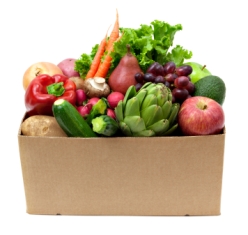Community supported agriculture (CSA) is a sustainable food production system where farmers sell direct to the consumer. Farmers grow a product consumers want, in exchange for them supporting the farmer.
It provides small landholders who farm close to large urban populations with potential economic opportunities. CSA encourages both farmers and consumers to form a relationship and share the risk of agricultural production providing economic, social and environmental benefits.
Farmers producing for CSA groups can either supply limited produce from their own farm or team up with other farmers to provide a wider range of produce including vegetables, fruit, herbs, flowers, meat and eggs.
CSA meets growing demand for local sustainable food production
Interest in CSA has grown as consumers have demanded fresh, sustainable food that is produced locally. CSA involves the establishment of a consumer group that signs up to a 6-12 month subscription with a farmer. Subscriptions are paid in advance or in instalments throughout the growing season. Consumers can receive weekly or fortnightly deliveries, collect produce from a central point or collect directly from the farm.
 |
The type and quantity of produce delivered depends on the time of season, level of production (how much there is to go around) and other vagaries of farming. CSA enables consumers and farmers to share the financial, environmental, and farming risks such as droughts, floods, pests and diseases. In exchange for consumers sharing these risks they benefit from a connection with their food, knowing where it comes from and understanding how food is produced.
When is CSA a suitable business model?
CSA is best suited to small, independent, intensive farms that produce fresh produce using ecological, organic or biodynamic farming methods that are otherwise difficult for consumers to source.
Small farms that are close to the peri-urban fringe are the most capable of participating in successful CSA schemes.
CSA programs can operate successfully on small farms where limited yet diverse volumes of food are produced. Small farmers involved in CSA place a greater emphasis on sustainable food production, implementing a range of sustainable farming practices.
Benefits of CSA to small farms
These are some of the main benefits to small farms of participating in community supported agriculture systems:
- Building a strong connection with consumers
- Economic security
- Less waste
- Guaranteed market access
- Reduced costs
Getting started in community supported agriculture
Starting a CSA farm will require a consumer group that is keen to know exactly where and how its food is produced, one that it is committed to local farmers and is prepared to share the risk. Farmers will need to have fertile land that is suitable for intensive food production and strong people skills. They will need to have a range of farming skills that enable them to manage multiple crops or enterprises at varying stages of development.
Success of CSA will depend on effective communication between the farmer and consumer. Communication is important so the consumer understands seasonal and week-to-week delivery variations, ensuring long-term commitment from CSA members.
Farmers can communicate with CSA members via:
- Farm visits and walks
- Newsletters, updating consumers on current seasonal conditions and production
- Recipes and ideas on using in-season produce
- Social functions, ensuring consumers are regularly connected with the farm
- Where to from here?
CSA offers consumers the opportunity to obtain safe sustainable food because they know exactly where and how it has been produced. At the same time, the system enables small landholders to successfully compete in the food market against much larger companies.
The next article is this series will outline the benefits of forming a producer and marketing group.
About the author
The author Charlie Roberts is one of the FarmStyle Australia experts, has a Bachelor of Farm Management and a Masters of Business Administration. He has worked for a number of agricultural companies in both New Zealand and Australia. He has a wealth of experience working with farmers in a range of environments.



